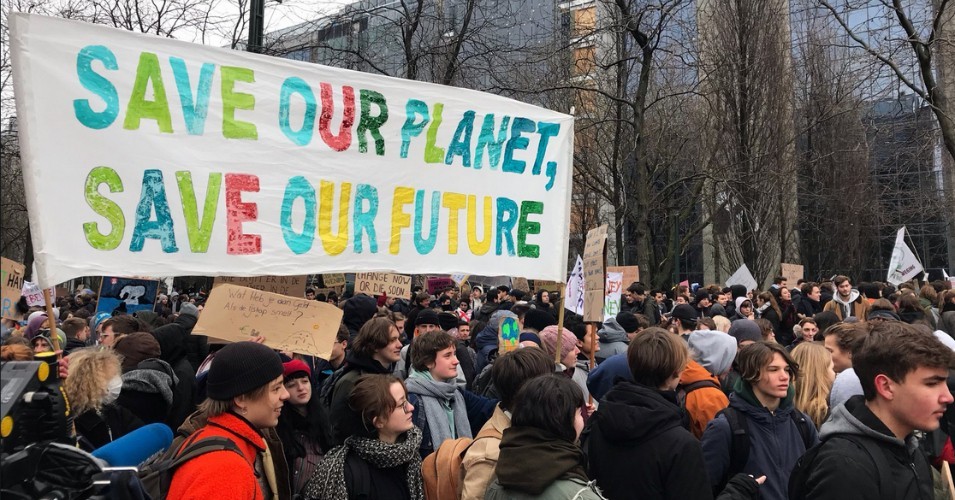Earth In Extremis While Trump Plays Ostrich

Storms are savaging East Africa where rainfall in Ethiopia, Somalia, Kenya, Uganda and Tanzania is now over 300 mm (about a foot) higher than the 30-year mean tallied since 1981. The subsequent flooding and landslides have affected 2.8 million people displacing many and reportedly killing 300 according to the UN Office for the Coordination of Humanitarian Affairs.
Thousands of miles away at the other end of the Indian ocean, there is extreme dry heat across Australia with an 80 percent chance of exceeding the median maximum temperature for the October-February summer period. It has led to an early start to the bushfire season as about 140 are already raging in New South Wales. Among the worst is a vast and so far uncontrollable fire about 40 miles outside Sydney, with evacuation warnings along its perimeter.
The cause of such extreme weather at the two ends of the Indian Ocean is described by weather scientists as the dipole effect — a sea surface temperature difference between the Arabian Sea western end and the south of Indonesia eastern end. A positive dipole means warmer ocean temperatures in the west end and cooler in the east. A negative dipole is the opposite; and a neutral dipole, means even temperatures and normal weather in the adjacent land areas.
This year’s warmer Indian Ocean temperatures in the western section have led to more storms and cooler, much wetter weather in East Africa, while cool waters pooling off Indonesia mean dry weather, causing extreme heat in Australia. At a 2C temperature difference, this positive dipole is one of the strongest Indian Ocean dipoles on record. Such a rare event occurring once in about 17 years in the past is now expected once in 6 years. Why? The culprit is climate change.
It projects a future of more frequent, more extreme weather unless we reduce greenhouse gas emissions and begin to eliminate the record high CO2 levels already in the atmosphere.
The rest of the world is not immune from extreme weather events. In a historic flood not too long ago this year, Venice’s iconic St. Mark’s square lay hip-deep in water threatening the frescoes in the church itself. And in the US, coastal flooding on the east coast has been featured by the New York Times (As Sea Levels Rise, So Do Ghost Forests, October 8, 2019). The ‘ghost forests’ refer to trees in coastal areas dying off due to frequent incursions of saltwater; it kills them from the roots up.
An excellent estimate of coastal flooding on the East and Gulf coasts, Encroaching Tides, was prepared by the Union of Concerned Scientists a five years ago. Sober reading, the report’s prognosis of coastal inundation and sea level rise over the next three decades is of concern to communities from Maine to Texas. Adaptation to new norms, protective sea walls, economic consequences, the responsibilities of Municipalities, States and the Federal Government, and a retreat from heavily impacted areas are the conclusions. Is anybody listening?
The US is also not immune from fires. California’s Kincade fire lasting two weeks through November 6 this year burnt almost 78,000 acres. The largest 2019 wildfire in the state, it was the largest ever for Sonoma county—evacuation orders and warnings covered almost everyone living in it. For the first eleven months of 2019 there have been 46,706 wildfires compared to 47,853 for all of 2018. Blame the downslope Santa Ana winds for fanning them.
If such is the state of our earth in extremis, COP25 the UN Climate Change Conference, is endeavoring to mitigate the major cause: climate change. It concludes in Madrid, Spain this week (Dec 13) having been displaced from Chile due to riots by an unhappy populace. And celebrity climate activist Greta Thunberg was obliged to hitch a yacht ride back across the Atlantic arriving just in time to demonstrate. Everything helps.
COP25’s ambitious aim is to up the ante from the 2C temperature rise limit of the Paris agreement, adopted by COP24 last year in Poland, to only 1.5C. A laudable aim perhaps, yet the worst polluters since the industrial revolution are comfortably ensconced, enjoying their wealth, without bearing a heavier burden — in the case of the US very little as Donald Trump has withdrawn from the Paris agreement. Indeed a vexing state of affairs for the world when major players shirk their responsibilities.

0 Comments:
Post a Comment
Subscribe to Post Comments [Atom]
<< Home